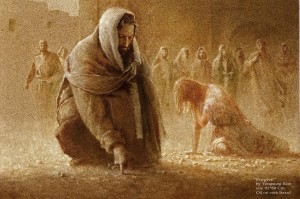 When we hear this story of Jesus and the sinful woman, how many of us get stuck thinking not of the great depth of mercy that Christ showed, but “What was Jesus writing on the ground?” He was being challenged by people of authority, and he bends down and writes something. What did he write?
When we hear this story of Jesus and the sinful woman, how many of us get stuck thinking not of the great depth of mercy that Christ showed, but “What was Jesus writing on the ground?” He was being challenged by people of authority, and he bends down and writes something. What did he write?
Look at Christ’s response to the people petitioning for the death of the adulteress woman, “Let the one among you who is without sin be the first to throw a stone at her.” Of course we see that Christ was instructing them not to throw a stone, but we find something else. He reveals to them his authority, and their lack of it. When he says, “Let the one among you who is without sin be the first…”, he is referring to himself, only he has the authority to make such a decision, and he has chosen not to condemn but to restore. He says to her, “Neither do I condemn you…”
But not only was he revealing to them their lack of authority, he was establishing a new way of faith in him. When confronted by leaders of the law of Moses, he bends down and writes. His bending down signifies how he came down from heaven and became man. His writing on the earth, signifies how he is establishing a new law which will remain until the end of the world. Scripture tells us that the old law was written by the finger of God on stone tablets. What we find is Christ writing with his own human finger, not on stone tablets which can be broken, but on the earth itself showing that this new way will last until he comes again.
The Gospel, instead of telling what Christ wrote, tells us that Christ himself is the new law. His actions, his words, how he treated that woman; that is the new law which he has the authority to give and which will last until the end of the world. The words on the ground is intentionally not revealed; he is the living Word. And who does the woman represent? The adulteress woman represents all who have ever sinned. She represents the whole of humanity, she represents Christ’s bride the Church, and she represents every one of us to whom God speaks saying, “Go, and from now on do not sin anymore.”
We may think that once someone commits a certain wrong, their value is forevermore decreased even sometimes to the point of deserving death. But Christ steps in and says, “You are valuable to me; I want to restore you. I want to give you the greatest possession there is; myself; take me and sin no more.” This is what Isaiah prophecies about in the first reading. God said to him, “I am doing something new.” “I am putting water in the desert for my chosen people to drink.” When it feels like we are in the desert; when it feels like we have lost our dignity and joy to sin; know that Christ still wants to possess you; and he wants to give himself to you as your possession. With the new water, with the gift of the Holy Spirit we are able to continue on living, to grow in holiness, to be conformed to Christ Jesus.
This is what St. Paul says in the second reading. Here was a man who had sinned greatly. He had directly opposed Christ by capturing Christian leaders and bringing them for trial. But he had not lost his value to Christ. His dignity and joy was restored, even elevated. St. Paul exclaims, I am his possession. One interesting thing about the word “possess” is that it is a combination of two words in Latin. “To be able” and “to sit.” To possess something “is to be able to sit with it.” This connects with what we find at the beginning of the Gospel before the leaders of the old law challenged Jesus. We are told that “all the people started coming to him, and [Jesus] sat down and taught them.” Jesus was sitting with them. He was giving himself to them as their possession.
Consider choosing one thing to “sit with” for the rest of time. Would I be happy sitting with a pile of cash, with my favorite car, with a large house that is all paid for. Eventually those things become boring and needless. We would be happier choosing Christ; then we could ask him, “What did you write on the ground that day?” And he might tell you, “Fr. Jason has it all wrong.” =) Yes even relationships with our loved ones are no comparison to possessing Christ and being possessed by him. Being with him, and being taught by him for all eternity, above life, about love, knowing of his forgiveness and mercy, this is infinitely more valuable than anything else we can possess. No matter our past sins or even our future ones, he desires us and our dignity remains restorable.


No, I don’t think he will say “Father Jason had it wrong.” Spot on. Great homily, especially the reflection on the writing on the ground. Thanks, Father!